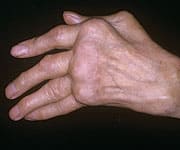Life Extension Magazine®
With the removal of Vioxx® from the market, and sales of other drugs in this class plummeting, scientists are working overtime to identify natural agents that safely block the underlying factors that give rise to inflammation in the body. Researchers have focused their microscopes on the herb boswellia, which works to block a lethal pro-inflammatory enzyme called 5-lipoxygenase (5-LOX). Until now, only limited strategies have been available to fight the insidious effects of 5-LOX, a potent contributor to inflammatory processes involved in diseases as diverse as cancer, atherosclerosis, arthritis, inflammatory bowel disease, and asthma. Boswellia BasicsFor thousands of years, folk medicine practitioners have used the herb boswellia (Boswellia serrata) to treat a wide range of conditions that we now know are caused by inflammation. This herbal extract is derived from gum resin secreted by the boswellia tree, part of a family of medicinal plants grown and used in India, Africa, China, and the Middle East. Fighting Inflammation by Inhibiting LOX EnzymesIn the late 1970s, researchers discovered that boswellia produces notable anti-inflammatory effects that are distinct from those produced by nonsteroidal anti-inflammatory drugs (NSAIDs) such as ibuprofen and aspirin.
NSAIDs quell inflammation primarily by inhibiting the cyclooxygenase-2 (COX-2) enzyme.1 Unfortunately, NSAIDs also block the COX-1 enzyme, which is needed to maintain a healthy stomach lining. While NSAIDs are partially effective in treating pain and inflammation, side effects such as stomach irritation and bleeding, kidney toxicity, and peptic ulcers make them less appealing for long-term use. A primary cause of NSAID toxicity is over-inhibition of the COX-1 enzyme. The stomach-damaging properties of NSAIDs appeared to be solved in 1999, with the approval of selective COX-2 inhibitors that demonstrated less stomach toxicity than NSAIDs. As early as July 2000, however, Life Extension alerted its members to the risks associated with selective COX-2 inhibitors. Since then, reports about the potentially dangerous cardiac side effects of COX-2 inhibitors2 have led scientists to intensify the search for safer options.
Potential Uses in Preventing and Managing CancerBoswellia shows great promise in the prevention and management of several forms of cancer. Pharmaceutical companies are now testing drugs that inhibit LOX enzymes, for use as potential cancer therapeutics.1 German scientists have demonstrated that boswellia extract is a more potent inhibitor of the enzymes that encourage cancer growth in humans than are certain chemotherapy drugs.6 Based on these positive results with boswellia, the researchers believe that the plant’s extracts may help prevent the development and spread of cancer. Other researchers have tested boswellia extract against five different types of human leukemia cells and two types of human brain cancer cells. They found that boswellia inhibited the proliferation of these cancerous cells by prompting them to self-destruct. Stronger potencies of boswellia were more effective in promoting cancer cell death, thus demonstrating a dose-dependent effect. The Swiss researchers conducting this trial suggested that boswellia may be able to prevent or treat these cancers.7 Scientists from the Cleveland Clinic found that an extract of boswellia was effective against human meningioma cells, which are typically benign tumors of the brain’s covering. Boswellia worked by decreasing the cells’ ability to spread and by killing the tumor cells.8 Boswellia has also attracted the attention of prostate cancer researchers. Prostate cancer cells sampled from men with the disease display an abundance of the 5-LOX enzyme.9 Other research has found that agents that inhibit the 5-LOX enzyme kill human prostate cancer cells,10 suggesting that 5-LOX inhibitors such as boswellia may have applications in preventing or arresting the growth of prostate cancer.9,10 Boswellia extracts also demonstrate promise in fighting melanoma, the deadliest form of skin cancer. Using advanced microscopy and cell-tracking techniques, scientists were able to observe how boswellia extracts caused melanoma cells to differentiate in a healthy way and to adopt cell-growth patterns resembling those of normal cells, while becoming less able to metastasize. Using these techniques, they also observed that boswellia caused fibrosarcoma (connective tissue cancer) cells to lose their ability to metastasize, and then induced cellular suicide (apoptosis) in these same cells.11 At this point, there is enough evidence to encourage researchers to continue looking for therapeutic treatment options utilizing boswellia in some of the most serious diseases. Reducing Inflammation to Lower Atherosclerosis RiskInflammation is an important contributor to atherosclerosis and the development of heart disease. Using boswellia to inhibit the 5-LOX enzymes and reduce inflammation may prove to be an important element in preventing and treating atherosclerosis. Genetic research recently revealed an intriguing correlation between 5-LOX and atherosclerosis. Scientists discovered that mice with a genetic defect that resulted in their having only one copy of the 5-LOX gene (rather than the usual two copies) were completely protected from developing atherosclerosis.12 Researchers believe that 5-LOX contributes to atherosclerosis in several ways. As noted earlier, increases in the 5-LOX enzyme result in excess leukotriene products that chemically attract white blood cells to adhere to the arterial walls. Furthermore, leukotrienes may promote vascular permeability and low-density lipoprotein (LDL) oxidation. These combined effects may promote the development of atherosclerotic plaques in the arteries, a known risk factor for heart attacks.12 Using boswellia extract to inhibit 5-LOX-induced leukotriene production could thus represent an effective strategy to prevent or treat atherosclerosis.12 | ||||
Boswellia Improves Symptoms of ArthritisOsteoarthritis and rheumatoid arthritis can cause disabling pain and immobility in aging adults. Boswellia may offer relief for arthritis suffers because of its well-known analgesic, anti-arthritic, and anti-inflammatory properties. Osteoarthritis, the “wear and tear” arthritis, is caused by deterioration of the cartilage that cushions joints. Research suggests that boswellia helps prevent the deterioration of cartilage and joint tissue. Scientists now theorize that boswellia may work by inhibiting the breakdown of connective tissues that is caused by tumor necrosis factor-alpha (TNF-a)-induced expression of matrix metalloproteinase enzymes.13 A pre-clinical animal study demonstrated boswellia’s benefits in managing osteoarthritis. Dogs suffering from osteoarthritis received boswellia extract once daily for six weeks. After only two weeks of therapy, 71% of the animals showed significant improvements in clinical symptoms of arthritis, including reduced pain, stiffness, and lameness.14 In a human study, boswellia was similarly shown to be effective in adults with osteoarthritis. Thirty subjects with osteoarthritis of the knee took part in a 16-week, randomized, double-blind, placebo-controlled trial. All of those who took a boswellia supplement reported less pain and swelling, increased knee flexion, and the ability to walk a greater distance.15 Rheumatoid arthritis is classified as an autoimmune disorder, in which the body attacks its own tissues as though they were foreign invaders. Boswellia may also offer relief of autoimmune-related rheumatoid arthritis. Boswellia can help reduce immune cells that encourage inflammation while increasing the number of immune cells that inhibit inflammation.16 Studies indicate that boswellia’s ability to modulate the immune system and inhibit inflammatory activity may help improve the symptoms of rheumatoid arthritis and other autoimmune conditions.17
Critical Support Against Inflammatory Bowel DiseasesUlcerative colitis and Crohn’s disease are known as inflammatory bowel diseases. Ulcerative colitis primarily affects the colon, while Crohn’s disease may affect the entire gastrointestinal tract. These autoimmune conditions are marked by symptoms such as severe gastrointestinal pain and cramping, diarrhea, fatigue, weight loss, and malnutrition. Boswellia may offer much-needed support for people facing these challenging conditions. A recent survey of German patients with inflammatory bowel disease showed that over one third used complementary and alternative medicines—such as herbal therapies, homeopathy, probiotics, or acupuncture—to help manage their condition. Those who used boswellia extract, however, reported better results than those using other approaches.18
Researchers recently tested boswellia extract in animals with experimentally induced inflammatory bowel disease. The animals demonstrated tissue injury and adherence of white blood cells to the gastrointestinal lining. When the animals received boswellia extract, however, they exhibited less inflammation and destruction of gastrointestinal tissue. These benefits contributed to a reduction in the symptoms of inflammatory bowel disease.19 Other researchers tested boswellia extract in an animal model of ulcerative colitis to assess its mechanism of action and compare its efficacy with a steroid commonly used to treat the disease in humans.20 They found that the boswellia extract protected the colon by significantly reducing disease activity, as measured by decreased recruitment and adherence of white blood cells as well as platelets in the inflamed colon. They also discovered that boswellia decreased the presence of a biochemical known as P-selectin that plays a role in active colitis. Boswellia’s impressive protective effects were similar to those seen in patients receiving steroids to reduce their symptoms of colitis. Boswellia shows important treatment activity against ulcerative colitis. In a clinical trial of 30 ulcerative colitis patients, 20 patients took a conventional boswellia extract three times daily for six weeks, while 10 patients in the control group took sulfasalazine (a NSAID used to treat inflammatory bowel disease) three times daily for six weeks. A remarkable 90% of those treated with boswellia showed improvement in one or more disease indicators, compared to only 60% in the sulfasalazine group who showed similar improvement. Even more impressive was that 70% of the boswellia-treated patients went into disease remission, compared to 40% of those taking sulfasalazine.21
Blocking Leukotrienes Improves Asthma SymptomsCases of asthma are dramatically increasing. An inflammatory disorder of the airways, asthma causes shortness of breath, wheezing, chest tightness, and coughing. By blocking 5-LOX-induced leukotriene production, boswellia may offer relief from the breathing difficulties that characterize asthma.
In a double-blind, placebo-controlled study of 80 asthma patients, 40 patients took an extract of boswellia three times daily for six weeks, and 40 patients took a placebo.22 Of patients taking boswellia, 70% showed an improvement in their symptoms, including the ability to inhale and exhale normally. Additionally, the boswellia-treated subjects demonstrated a decrease in eosinophils, which are white blood cells associated with allergy and asthma. By contrast, only 27% of the placebo-treated group demonstrated improved symptoms. ConclusionEvery year, scientists are learning more about how inflammation promotes various disease processes. Recent studies have shed light on the interplay between pro-inflammatory lipoxygenase (LOX) enzymes and conditions such as cancer, heart disease, and asthma. Long used as a traditional herbal medicine, boswellia blocks 5-lipoxygenase (5-LOX), one of the most damaging of the LOX enzymes. Laboratory and clinical studies alike demonstrate that boswellia holds promise in averting the numerous diseases associated with excessive levels of inflammation in the body. Boswellia may benefit adults seeking to manage or prevent conditions caused by the debilitating effects of chronic inflammation. | ||||||||
| References | ||||||||
| 1. Poff CD, Balazy M. Drugs that target lipoxygenases and leukotrienes as emerging therapies for asthma and cancer. Curr Drug Targets Inflamm Allergy. 2004 Mar;3(1):19-33. 2. Lalithakumari K, Krishnaraju AV, Sengupta K, Subbaraju GV. Safety and toxicological evaluation of a novel, standardized 3-o-acetyl-11-keto-beta-boswellic acid (AKBA)-enriched boswellia serrata extract (5-Loxin). Toxicology Mechanisms and Methods. 2006:16;199-226. 3. Safayhi H, Mack T, Sabieraj J, et al. Boswellic acids: novel, specific, nonredox inhibitors of 5-lipoxygenase. J Pharmacol Exp Ther. 1992 Jun;261(3):1143-6. 4. Safayhi H, Rall B, Sailer ER, Ammon HP. Inhibition by boswellic acids of human leukocyte elastase. J Pharmacol Exp Ther. 1997 Apr;281(1):460-3. 5. Roy S, Khanna S, Shah H, et al. Human genome screen to identify the genetic basis of the anti-inflammatory effects of Boswellia in microvascular endothelial cells. DNA Cell Biol. 2005 Apr;24(4):244-55. 6. Syrovets T, Buchele B, Gedig E, Slupsky JR, Simmet T. Acetyl-boswellic acids are novel catalytic inhibitors of human topoisomerases I and IIalpha. Mol Pharmacol. 2000 Jul;58(1):71-81. 7. Hostanska K, Daum G, Saller R. Cytostatic and apoptosis-inducing activity of boswellic acids toward malignant cell lines in vitro. Anticancer Res. 2002 Sep;22(5):2853-62. 8. Park YS, Lee JH, Bondar J, et al. Cytotoxic action of acetyl-11-keto-beta-boswellic acid (AKBA) on meningioma cells. Planta Med. 2002 May;68(5):397-401. 9. Gupta S, Srivastava M, Ahmad N, et al. Lipoxygenase-5 is overexpressed in prostate adenocarcinoma. Cancer. 2001 Feb 15;91(4):737-43. 10. Matsuyama M, Yoshimura R, Mitsuhashi M, et al. Expression of lipoxygenase in human prostate cancer and growth reduction by its inhibitors. Int J Oncol. 2004 Apr;24(4):821-7. 11. Zhao W, Entschladen F, Liu H, et al. Boswellic acid acetate induces differentiation and apoptosis in highly metastatic melanoma and fibrosarcoma cells. Cancer Detect Prev. 2003;27(1):67-75. 12. De Caterina R, Zampolli A. From asthma to atherosclerosis--5-lipoxygenase, leukotrienes, and inflammation. N Engl J Med. 2004 Jan 1;350(1):4-7. 13. Roy S, Khanna S, Krishnaraju AV, et al. Regulation of vascular responses to inflammation: inducible matrix metalloproteinase-3 expression in human microvascular endothelial cells is sensitive to antiinflammatory Boswellia. Antioxid Redox Signal. 2006 Mar;8(3-4):653-60. 14. Reichling J, Schmokel H, Fitzi J, Bucher S, Saller R. Dietary support with Boswellia resin in canine inflammatory joint and spinal disease. Schweiz Arch Tierheilkd. 2004 Feb;146(2):71-9. 15. Kimmatkar N, Thawani V, Hingorani L, Khiyani R. Efficacy and tolerability of Boswellia serrata extract in treatment of osteoarthritis of knee—a randomized double blind placebo controlled trial. Phytomedicine. 2003 Jan;10(1):3-7. 16. Chevrier MR, Ryan AE, Lee DY, et al. Boswellia carterii extract inhibits TH1 cytokines and promotes TH2 cytokines in vitro. Clin Diagn Lab Immunol. 2005 May;12(5):575-80. 17. Ammon HP. Boswellic acids in chronic inflammatory diseases. Planta Med. 2006 Oct;72(12):1100-16. 18. Joos S, Rosemann T, Szecsenyi J, et al. Use of complementary and alternative medicine in Germany - a survey of patients with inflammatory bowel disease. BMC Complement Altern Med. 2006;619. 19. Krieglstein CF, Anthoni C, Rijcken EJ, et al. Acetyl-11-keto-beta-boswellic acid, a constituent of a herbal medicine from Boswellia serrata resin, attenuates experimental ileitis. Int J Colorectal Dis. 2001 Apr;16(2):88-95. 20. Anthoni C, Laukoetter MG, Rijcken E, et al. Mechanisms underlying the anti-inflammatory actions of boswellic acid derivatives in experimental colitis. Am J Physiol Gastrointest Liver Physiol. 2006 Jun;290(6):G1131-7. 21. Gupta I, Parihar A, Malhotra P, et al. Effects of gum resin of Boswellia serrata in patients with chronic colitis. Planta Med. 2001 Jul;67(5):391-5. 22. Gupta I, Gupta V, Parihar A, et al. Effects of Boswellia serrata gum resin in patients with bronchial asthma: results of a double-blind, placebo-controlled, 6-week clinical study. Eur J Med Res. 1998 Nov 17;3(11):511-4. 23. Safayhi H, Sailer ER, Ammon HP. Mechanism of 5-lipoxygenase inhibition by acetyl-11-keto-beta-boswellic acid. Mol Pharmacol. 1995 Jun;47(6):1212-6. 24. Sailer ER, Subramanian LR, Rall B, Hoernlein RF, Ammon HP, Safayhi H. Acetyl- 1 keto-beta-boswellic acid (AKBA): structure requirements for binding and 5-lipoxygenase inhibitory activity. Br J Pharmacol. 1996 Feb;117(4):615-8. 25. Available at: http://www.plthomas.com/PLTbrands/5-Loxin%20Fact%20Sheet%209-05.pdf. Accessed September 12, 2006. |






